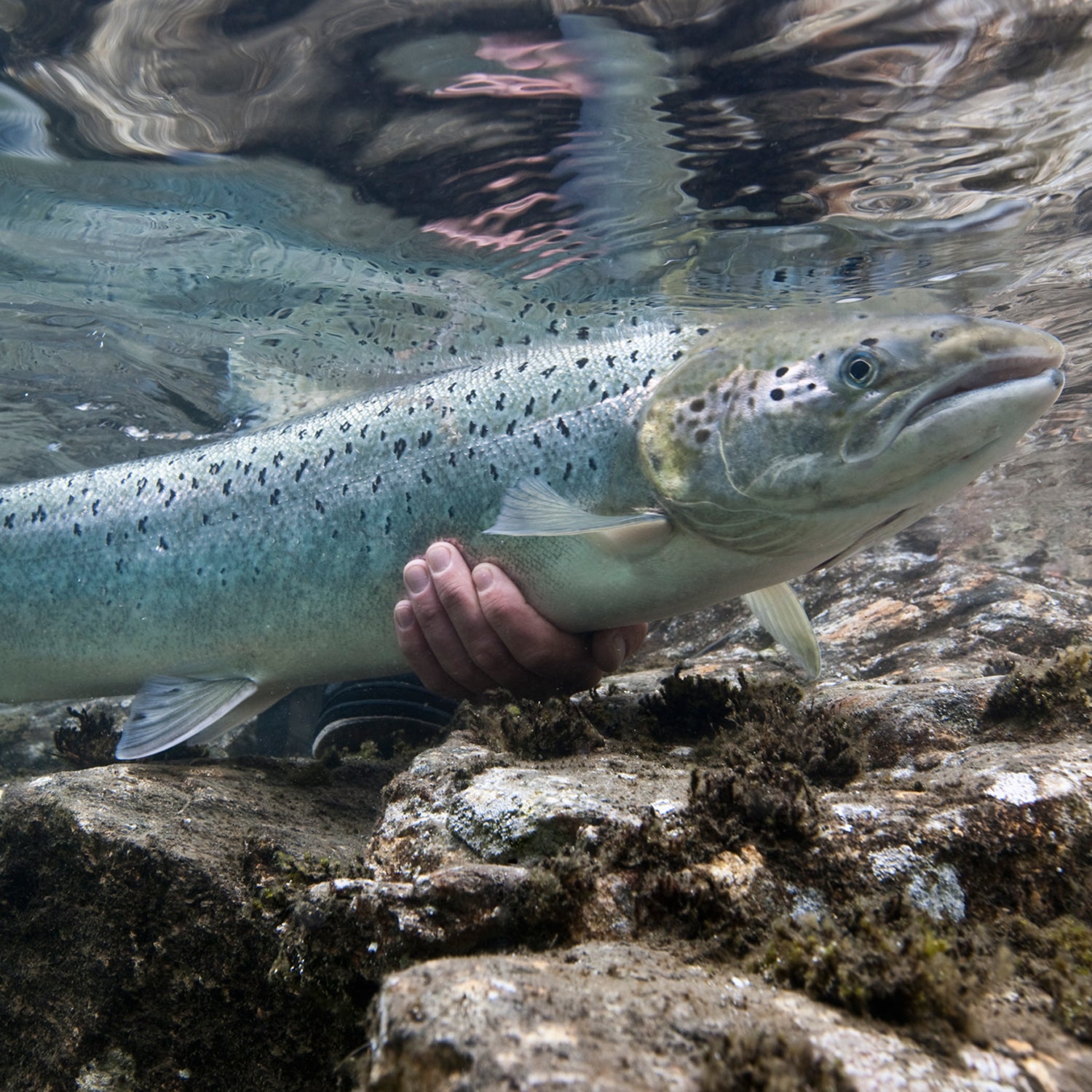Ask any experienced angler about their favorite part of fly-fishing, and you’re liable to get a single reply: the fight. To set your hook in a trout’s lip is to invite an arm-wrestling match against a subaquatic bowling pin made of primal rage. It’s why many of us fish.
In the midst of that adrenaline rush, it’s safe to say that few pause to wonder what it must feel like to be on the other end of the line, struggling against the tug of a metal hook impaled through your lip. Does it hurt? Do the creatures suffer when they begin to asphyxiate as they’re held out of water for the requisite photo?
These are the questions Brian Key sought to answer earlier this year. In a commentary for a new academic journal called Animal Sentience, the developmental neurobiology professor at the University of Queensland determined that fish lack the brain structure required for feeling pain. “What then do noxious stimuli”—that is, painful events, like getting pierced with a hook—“feel like to a fish? The evidence best supports the idea that they don’t feel like anything to a fish.”
Key’s line—the same one grandfathers have told kids casting into lakes for generations—may have seemed innocuous, but the opinion set the sleepy field of ichthyology, or fish zoology, on fire. His paper struck a nerve with animal pain researchers, garnering from academics around the world—and all but three disagreed with Key’s assertions. compared Key’s argument to “a ramshackle structure gaping with holes and pieced together from imperfectly understood neuroscience and often faulty literature citations.”
“The broad consensus from the scientific community is that fish most likely feel pain, and it is time governments display courage enough to act.”
“People got very upset, and some of the commentaries were not kind,” says Culum Brown, a behavioral ecologist who studies fish at Macquarie University in Sydney, Australia. “The broad consensus from the scientific community is that fish most likely feel pain, and it is time governments display courage enough to act,” .
The backlash shouldn’t surprise. In the past decade, researchers have produced a steady stream of evidence suggesting that fish do indeed feel pain. the animals have pain receptors in their brains, learn to , and show when confined in uncomfortable spaces. But actually proving what fish feel is nearly impossible. All scientists can do is poke or prod or shock them and observe their responses.
Assuming the overwhelming majority of researchers are right, the finding presents the millions of discerning catch-and-release recreationists and hundreds of millions of fish eaters around the world with a moral quandary: How much pain is too much for us to bear?
The answer could have real-world policy effects on the fishing industry, which pulls in between 1.7 and 3 trillion fish each year. Animal rights groups, such as PETA, argue that the haul amounts to animal cruelty. Closer to home, what does this mean for the piscavores of the world? Is there a pain-dependent case for choosing chicken or beef, which can be humanely raised and slaughtered, over fish? And what about the millions of us who find solace casting into the riffles of a deserted stream? Is sportfishing—or even catch-and-release fly-fishing—“animal abuse” and “torture,” as fish advocate Mary Finelli claims?
The idea that fish are unthinking, unfeeling “lower animals” is an old one, at least to the days of Descartes, who argued that animals are not conscious beings. And although in the past century we’ve come to accept that most mammals feel pain (ever step on your dog’s tail?), our views on fish haven’t budged. “Most people are misinformed about these animals,” says Jonathan Balcombe, author of the book What a Fish Knows.*
In some sense, this isn’t too surprising. After all, does any creature look as mindless as the fish, with its blank stare and dumb, gaping mouth? But in the past decade, fish—from rainbow trout to grouper to goldfish—have consistently awed scientists with their intelligence. Researchers the tusk fish using rocks to crack open clams, groupers with eels, and leopard sharks coming up to the surface for from trusted scientists.
Is there a pain-dependent case for choosing chicken or beef, which can be humanely raised and slaughtered, over fish?
And yet, societally, we treat fish differently than other animals that comprise the bulk of our dinner menus. A cow’s final moments walking down the kill chute are the subject of study and concern; McDonald’s vowed that all of its eggs will be from “cage-free” chickens by 2025. “But we’ve relegated fish to the cellar of the vertebrate group,” says Balcombe, who also heads up animal sentience at the Humane Society Institute for Science and Policy.
Victoria Braithwaite, a professor of fisheries and biology at Penn State, has done as much as anyone to change the public’s perception of fish as creatures numb to our treatment of them. She conducted pioneering research in the early 2000s and published a groundbreaking book in 2010 called Do Fish Feel Pain? She is also refreshingly undogmatic on the subject. “I have gone fishing, and my son fishes,” Braithwaite says. “I eat fish. That’s a choice we make. Part of our evolutionary background is that we eat other organisms—we are omnivorous. This is part of normal life.”
Braithwaite disagrees with Key’s assertions wholeheartedly. But, she says, evaluating pain in animals is not easy. Plenty of smaller creatures avoid harm as a survival instinct rather than fear of pain. And although we can perform experiments that cause fish harm, like injecting bee venom into a trout’s lips, we cannot tell exactly how it makes them feel. Because of this base uncertainty, the fish-feeling debate gets strangely deep, and fast. Sure, fish respond to “noxious stimuli,” in the industry parlance—they writhe, they rock back and forth, they rub their stung lips on rocks—but do they suffer? Are they conscious—that is, capable of having thoughts and emotions about their suffering?
“The first thing to know is to realize ‘pain’ is two processes,” Braithwaite says. The first involves your nerve endings detecting damage, a trait all animals evolved to help them avoid injury. Think of it this way, Braithwaite says: “If you pick up a hot cup, you drop it instantly, then you think about the pain a quarter of a second later.” Your nerves immediately detected the damage, but you didn’t feel anything. It’s an automatic and inefficient process: You still get injured. That’s where the second part—suffering—comes in. “Somewhere along the evolutionary process,” Braithwaite says, “we developed the ow factor,” the part of the response that actually hurts.
Showing the development of suffering—the “ow factor”—in fish “is much harder to prove,” Braithwaite says. The field has relied on behavioral studies to see how fish react to pain. Case in point: Fish injected with acid into their lips appear to get stressed out. But when you give them a dose of morphine, they go right back to normal. In other words, they appear to suffer.
“Many of us who are saying fish have this capacity are not saying that fish feel pain in the same way humans do,” Braithwaite says. But fish have pain receptors in their brains, and dozens have studies have shown them responding negatively to and actively trying to avoid pain. “To deny them an emotional response to damage that occurs? That seems really hard to do.”
Brown, the Australian behavioral ecologist, is fed up with the whole argument. The “debate” reminds him of climate denial, he says, with a majority of scientists on one side and minority that seem unwilling to accept mounting evidence. “The evidence, scientifically, is so overwhelmingly in favor—there might be some doubt, but not much more than on whether humans feel pain,” Brown says. “How sure do you have to be before you decide it’s true? It’s a bit like gravity. It’s a technically theory, yes, but you don’t doubt it.”
If fish feel pain, then many of us may have to rethink our life choices. We catch and eat nearly a thousand times more fish than terrestrial animals, and fishing practices in much of the world are barbaric. Conventional fishing kills millions of fish unnecessarily and most certainly subjects the animals to pain. “It really can’t be considered humane,” says Mary Finelli of Fish Feel.
Why do some folks abstain from eating land animals but shovel down pounds of cod? Finelli’s not sure. The Humane Society Institute’s Balcombe is equally puzzled by pescatarians who forgo livestock for moral reasons. “There isn’t any justification for eating a fish instead of chicken,” he says.
When it comes to sportfishing, researchers who study fish pain are less understanding. “You’re talking about piercing an animal through the face,” says Balcombe. “Sometimes through the eye. Probably a sensitive part of the body—they need those organs to sense things and find food. Then you reel it in by its weight, and it gets hauled out by its weight if you don’t have a net, then there’s asphyxiation if it’s not put back into the water.”
“It’s not necessarily intentionally cruel, but from the fish’s perspective, it involves pain,” he says. Brown, the Australian researcher, agrees. “I think most people would be horrified of a picture of someone standing triumphantly on top of an elephant. But fishing is no different. You see trophy pictures of fish all the time. It’s just not treated the same way.”
Even the kind of fishing most Americans think of as humane—catch and release with barbless hooks, where the fish are released without leaving the water—has plenty of critics. A showed that about 89 percent of fish survived release, but their chances vary significantly based on the angler’s actions. Fish hooked anywhere but the lip have low survival rates—sea bass “deep hooked” in their bodies survive about 59 percent of the time if the hooks are removed from their bodies. Rainbow trout played for ten minutes have an 88 percent survival rate, but this if the fish is kept out of water for 30 seconds.
Jim Martin has thought long and hard about fish. He spent 30 years with the Oregon Department of Fish and Wildlife and was chief of fisheries for six years. He spent time working as conservation director for Pure Fishing, a global fishing gear conglomerate. In 2005, Martin was inducted into the National Freshwater Fishing Hall of Fame. He is a fisherman’s fisherman.
“I’ve always gone on the assumption on that fish do feel pain, just like a deer or a bird feels pain,” he says. “The issue of hunting and fishing is one that just has to be ethically and morally dealt with on the assumption that the animals do feel pain, rather than trying to discount that and say they don’t feel anything.”
There are also ways to fish that maximize the fish’s chance to live to fight another day. The Ministry of Natural Resources in Ontario, which studied a number of catch-and-release papers, suggests anglers stick to , refrain from using live bait (which often leads to deep hooking), and avoid fishing on warm days, when increased river temperatures lead to greater trout deaths.
Martin is unwilling to tell anyone how to live their lives, but for his part, he feeds his family with the fish he catches and takes solace in knowing the money he spends on permits goes toward conservation in his state.
“Everybody has an ethical responsibility to decide how their activities are going to influence nature,” he says. “We’re all human beings. We all have values.”
*CORRECTION: A previous version of this article misstated the title of Jonathan Balcombe's book as What A Fish Feels.


